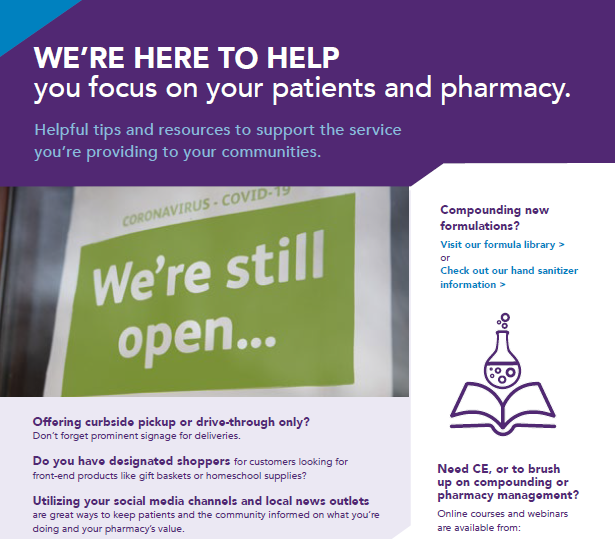Minimizing Dosing Errors: Recent Examples from ISMP
The Institute for Safe Medication Practices (ISMP) recently shared a medication error involving remdesivir vial labels that provides an important example for compounders.
[T]he hospital… stocked two different versions of the experimental drug. One formulation was a lyophilized powder for injection, 100 mg, and the second was an injectable solution with an equivalent 100 mg of the drug. However, the second vial was labeled 5 mg/mL, not 100 mg—and the only clue to the vial’s actual drug quantity was a separate line on the label that read “Contents: 21.2 mL.”
The pharmacy technician who made the compounding error used the second formulation to mix the doses. Instead of adhering to the standard remdesivir infusion protocol—a loading dose of 200 mg (two vials) followed by doses of 100 mg (one vial)—the technician mixed 200-mg solutions for the subsequent and loading doses.
The error was not caught until an end-of-day inventory reconciliation.
ISMP also warned of potential errors in propofol dosing after the FDA issued an EUA for propofol 20 mg/mL, which has twice the concentration of Diprivan 1% (propofol 10 mg/mL). They are advising providers to reprogram infusion pump libraries to avoid exceeding the maximum rate.
The root cause of both the remdesivir mistake and propofol alert is failing to recognize different configurations of starting drug product, which can lead to patient overdoses.
While compounded preparations may follow recognized dose titrations, it is common in our industry to deviate from dosing found in commercial products.
Compounding pharmacists can use these examples as a teaching tool for compounding staff to review SOPs and QA programs to minimize if not eliminate the risk of dosing errors.
More information on the ISMP “Acute Care Medication Safety Alert!” >
Our Compounding Support Services team has years of experience in pharmacy management and compounding operations. If you have any questions about lab design and workflow, regulatory compliance, and capital equipment, give our team a call or send us an email.
Ask Compounding Support ServicesLatest Articles
-
Posted: April 21, 2020Categories: Industry NewsRead more »
Covid-19 has led to a constantly changing regulatory environment to support patient care. But pharmacists need to take care to monitor national as well as state laws and guidelines.
-
Posted: April 17, 2020Categories: Compounding EducationRead more »
Download our one-page flyer with tips and resources to help support the service your pharmacy and staff are providing to your communities.
-
Posted: July 08, 2020Categories: Industry NewsRead more »
The Alliance for Pharmacy Compounding held their Advocacy Town Hall, which you can watch in its entirety...
-
Posted: June 25, 2020Categories: Industry NewsRead more »
A recent clinical trial from the UK showed decreased mortality for patients seriously ill with COVID-19 requiring oxygen or ventilators when treatment included the corticosteroid dexamethasone...
-
Posted: June 05, 2020Categories: Industry NewsRead more »
This week, two major medical journals retracted separate studies on Covid-19 treatments due to an inability to validate the data and methodology used in the studies.
-
Posted: May 29, 2020Categories: Compounding EducationRead more »
The Institute for Safe Medication Practices (ISMP) recently shared a medication error involving remdesivir vial labels that provides an important example for compounders...
-
Posted: May 14, 2020Categories: Compounding EducationRead more »
Change control SOPs are critical in sterile compounding - and pharmacy technicians are not the only ones who need to understand machines and tools in the lab and workflows.
-
Posted: May 11, 2020Categories: Compounding EducationRead more »
Formulations require different sample amounts to allow for an accurate result representative of the compounded preparation.
-
Posted: April 21, 2020Categories: Industry NewsRead more »
Covid-19 has led to a constantly changing regulatory environment to support patient care. But pharmacists need to take care to monitor national as well as state laws and guidelines.
-
Posted: April 17, 2020Categories: Compounding EducationRead more »
Download our one-page flyer with tips and resources to help support the service your pharmacy and staff are providing to your communities.
-
Posted: July 08, 2020Categories: Industry NewsRead more »
The Alliance for Pharmacy Compounding held their Advocacy Town Hall, which you can watch in its entirety...
-
Posted: June 25, 2020Categories: Industry NewsRead more »
A recent clinical trial from the UK showed decreased mortality for patients seriously ill with COVID-19 requiring oxygen or ventilators when treatment included the corticosteroid dexamethasone...
-
Posted: June 05, 2020Categories: Industry NewsRead more »
This week, two major medical journals retracted separate studies on Covid-19 treatments due to an inability to validate the data and methodology used in the studies.
-
Posted: May 29, 2020Categories: Compounding EducationRead more »
The Institute for Safe Medication Practices (ISMP) recently shared a medication error involving remdesivir vial labels that provides an important example for compounders...
-
Posted: May 14, 2020Categories: Compounding EducationRead more »
Change control SOPs are critical in sterile compounding - and pharmacy technicians are not the only ones who need to understand machines and tools in the lab and workflows.
-
Posted: May 11, 2020Categories: Compounding EducationRead more »
Formulations require different sample amounts to allow for an accurate result representative of the compounded preparation.
-
Posted: April 21, 2020Categories: Industry NewsRead more »
Covid-19 has led to a constantly changing regulatory environment to support patient care. But pharmacists need to take care to monitor national as well as state laws and guidelines.
-
Posted: April 17, 2020Categories: Compounding EducationRead more »
Download our one-page flyer with tips and resources to help support the service your pharmacy and staff are providing to your communities.









